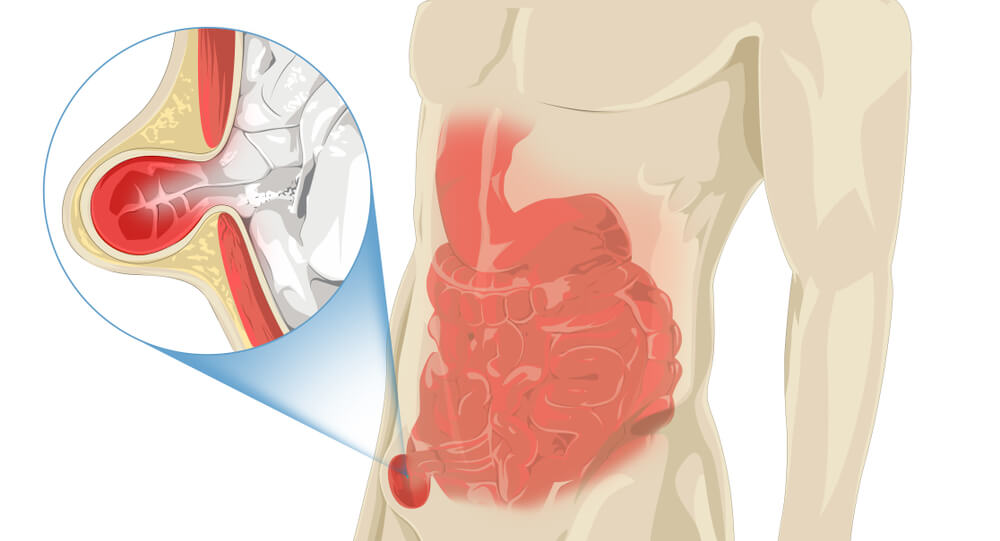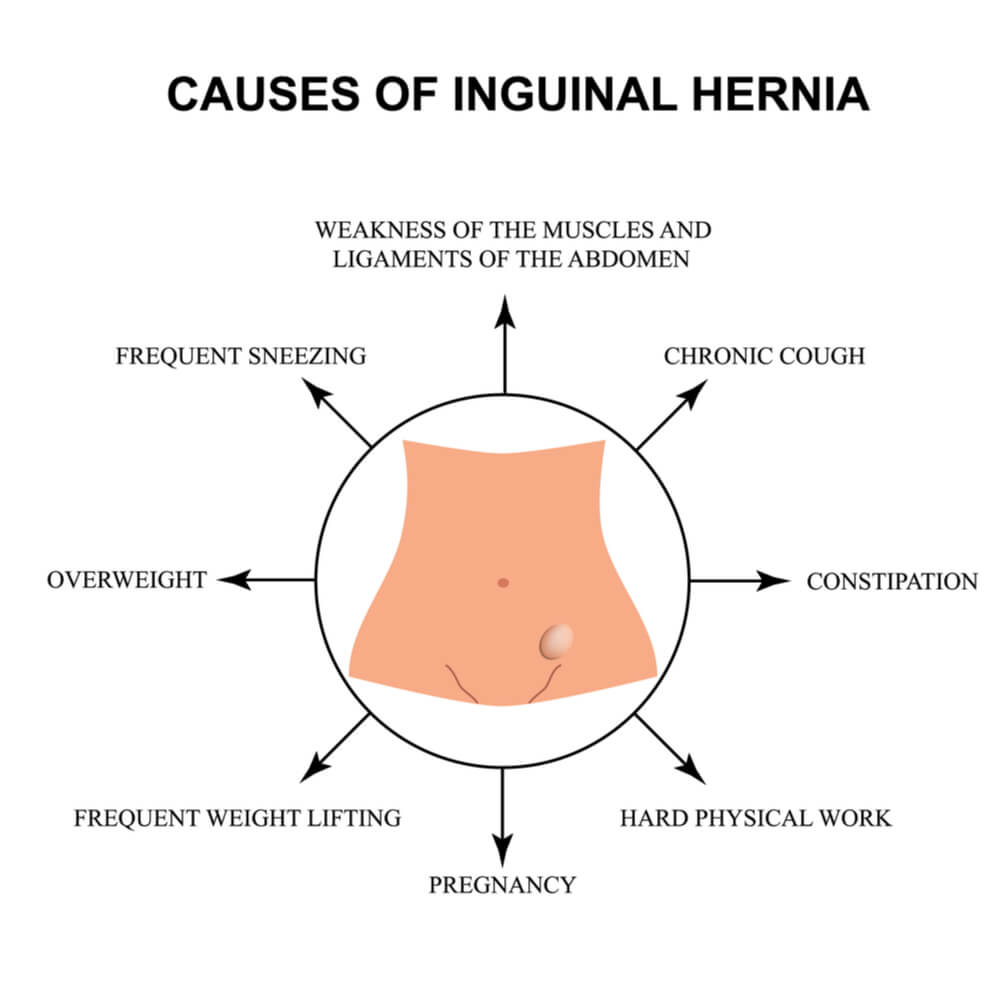An inguinal hernia is the result of tissue working its way through a weak area in the abdominal muscles. The affected tissue is most often a portion of the small intestines, fat, or, in women, a portion of the reproductive system. While an inguinal hernia itself is not dangerous, it can be painful and can lead to serious complications. Inguinal hernia repair is a straightforward procedure that can improve your quality of life.
Symptoms of an Inguinal Hernia
The main symptom of an inguinal hernia is a bulge, which can be located on either side of your pubic bone. The bulge may become more prominent when you are standing or when you cough. The area may ache or burn. You may also experience pain when bending, coughing, or when you lift something. Any feelings of pain, weakness, or pressure in the groin may indicate an inguinal hernia. You may need hernia treatment in Palm Beach County if you are experiencing any of these symptoms.

How to Know If You Need Hernia Treatment
Our diagnostic procedure determines if you have an inguinal hernia. The procedure will also determine its severity. A physical examination is often all that is needed to provide the diagnosis. During the exam, your medical provider may massage the area with the intent of returning the tissue to the abdominal cavity.
You may also receive one or more imaging tests, such as an MRI, ultrasound, or CT. These tools are useful to determine if there are any complicating factors that may affect treatment decisions.
Inguinal Hernia Treatment Options
Inguinal hernia repair surgery is minimally invasive and can ease pain and prevent further complications. It is the only effective inguinal hernia repair. In the past, treating patients with a supportive truss was often recommended. This external device does not repair the hernia, and may not even provide needed support. If the truss fits well and the individual is diligent that it remains positioned correctly, it may provide some pain relief. Today, your doctor may recommend a truss to help keep you comfortable while you wait for surgery. A truss is often a temporary solution.
What to Expect During Inguinal Hernia Repair Surgery
There are a few different types of inguinal hernia repair surgery. Your hernia surgeon will look at your particular case to make the decision about which procedure is right for you.
Open hernia repair requires an incision in the groin. The hernia surgeon will be able to identify the area containing the bulging intestine. The tissue is tucked back into the abdomen, and the surgeon uses synthetic mesh or stitches to reinforce the abdominal wall.
Minimally invasive hernia surgery uses a laparoscope to repair the hernia. A laparoscope is a thin tool that the surgeon can insert through a small incision at the belly button. The laparoscope, connected to a small camera, allows the surgeon to see the area. The surgeon will use mesh to cover the weak areas in the abdominal wall and help strengthen the area.
The incision from minimally invasive hernia surgery is closed with a few stitches and will result in a barely noticeable scar. This procedure has several advantages over open hernia repair. In addition to less scarring, the smaller incisions make recovery less painful. You can expect a shorter recovery period and will be able to return to your daily activities much sooner.
Complications From Untreated Inguinal Hernia
Whether you experience pain from the inguinal hernia or not, you may still develop complications. If the contents of the hernia become trapped in the abdominal wall, blood flow to the area can halt, creating a medical emergency.
If you have a hernia and develop sudden pain in the area, nausea, fever, or vomiting, or the area turns red or purple, you may have strangulation of the hernia. This requires immediate medical attention.
A less dangerous, but still painful complication from an untreated inguinal hernia, is the pressure it creates on surrounding tissues. It is normal for the hernia to enlarge if not surgically repaired. As it expands, it can travel into the scrotum, causing painful swelling. If you experience painful swelling, you should contact your doctor immediately.
What Causes Inguinal Hernia?

Not all inguinal hernias have a known cause. Some conditions that lead to their development include pre-existing weakness in the abdominal wall, conditions that increase pressure in the abdomen, pregnancy, strenuous activity, chronic coughing, and straining during bowel movements.
Weakness in the abdominal wall can develop in several ways. It can be an existing weakness, which occurs when the abdominal lining doesn’t close properly at birth. The weakness can also develop later due to strenuous activity, chronic cough from smoking, or deterioration due to aging. As pregnancy changes and sometimes weakens a woman’s abdominal wall, inguinal hernias can be an issue after pregnancy.
Who Is at Risk?
Anyone can develop an inguinal hernia at any age. Some factors that increase your risk include being male, being older, having a family history of inguinal hernias, pregnancy, chronic cough or chronic constipation, and previous inguinal hernias or hernia repairs.
There are some steps you can take to reduce your risk of developing inguinal hernias. Maintaining a healthy weight and eating a diet rich in fiber provides many health benefits, including reducing your risk of developing an inguinal hernia. If you smoke, you should stop. In addition to the many other health concerns associated with smoking, the chronic cough that smokers develop strains the abdominal wall. When lifting, always bend your knees rather than your waist. Get help when lifting anything heavy.
If you believe you may have an inguinal hernia, an accurate diagnosis is important. Even if you would like to avoid surgery and are experiencing few symptoms, an examination can determine the severity of your condition and give you warning signs to watch for.
Some individuals choose watchful waiting, which means they hold off on surgery until their condition worsens. If you choose to do this, it is important to do so under a physician’s care. While you may avoid surgery for the moment, about 70% of individuals who delay surgery will experience worsening symptoms and require surgical correction within five years.
Advanced Surgical Physicians Are Here for You
How can we help? There is no need to suffer from the pain of an inguinal hernia. If the symptoms mentioned in this article are familiar, there are effective treatment options available. You don’t need to live with pain. Contact us at Advanced Surgical Physicians today to schedule a consultation. Whether you are looking for a diagnosis or are ready to schedule surgery, our staff is ready to help.







